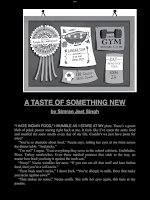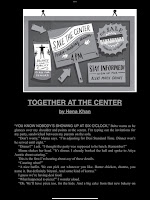Picked up 'The Door is Open: Stories of Celebration and Community by 11 Desi Voices' (2024), a book of short stories contributed by 11 writers, and edited by Hena Khan.
This is a compilation of the lived experiences of the South-Asian American community. The 11 inter-related stories revolve around a community center in the fictional town of Maple Grove in New Jersey.
Through middle-schoolers and their voices, the 11 stories celebrate diversity through festivals, major life events, holidays and the everyday activities at events held at the community center. They also had to fight against xenophobic campaigns to shut down this community center. It's a dilapidated building, but it's a focal point for the South-Asian American community in this town.
I'd be doing the writers a disfavor if I didn't name them all. They are Veera Hiranandani, Supriya Kelkar, Maulik Pancholy, Simran Jeet Singh, Aisha Saeed, Reem Faruqi, Rajani Larocca, Naheed Hasnat, Sayantani DasGupta, and Mitali Perkins. The writers didn't shy away from 'difficult' topics. They touched on single-parent households, disability and domestic violence, in-group judgments both real and perceived, ethnic and religious racism. I'll highlight my favorite three stories in this book.
'A Taste of Something New' by Simran Jeet Singh
Do we care if we liked the food that we're ethnically supposed to grow up with? I certainly don't like all the foods I eat as as child, nothing to do with whether they're Chinese or Japanese food, or Nyonya cuisine.
I generally like Asian food, but if you ask me if I like food from China, my answer is NO. So there. Foods from China aren't the types I grew up with. I dislike that sort of flavors. Ugh.
Narrator Jeevan doesn't like eating Indian food. He's irritated that it comes up in conversations all the time, especially when he's ethnically Indian. And he was shellshocked when his parents, without asking him, signed him up for an Indian cooking class at the Maple Grove Community Center.
"I HATE INDIAN FOOD," I MUMBLE AS I STARE AT MY PLATE. There's a green blob of palak paneer staring right back at me. It feels like I've eaten the same food and smelled the same smells every day of my life. Couldn't we just have pasta for once?
"You're so dramatic about food," Neena says, rolling her eyes at me from across the dinner table. "And picky."
"I'm not!" I argue. "I eat everything they serve in the school cafeteria. Enchiladas. Pizza. Turkey sandwiches. Even those mashed potatoes that stick to the tray, no matter how hard you bang it against the trash can."
"Nasty!" Neena wrinkles her nose. "If you can eat all that stuff and hate Indian food, then you're a self-racist."
"Taste buds aren't racist," I shoot back. "You're allergic to milk. Does that make you racist against cows?"
As unwilling as Jeevan was, he sighed and obediently went for class to help out his Prem Auntie who apparently was feeling lonely after her husband passed away. He still really disliked sabji. Although why ah, it's very nice vegetables and potatoes what.
Jeevan somehow decided that he enjoyed food prep and cooking. He isn't super into the food, but he isn't grossed out by the food anymore. "The sizzle begins almost immediately, and I brace myself for a visceral reaction. But to my surprise, the familiar aroma of cumin seeds and diced onions doesn't bother me." He even looked forward to returning next week to cook with Prem Auntie.
'Together at the Center' by Hena Khan
The editor herself also wrote this story of inclusivity and embracing diversity and divergent opinions.
A family is having an celebration, an ameen at the Maple Grove Community Center to mark narrator Halima's accomplishment of reading the entire Quran in Arabic after six years. 12-year-old Halimah didn't want her parents to turn it into a fancy party for adults. She wanted pizzas and a 'bounce house' and all that.
Then she heard her father and others talk about people wanting to close down the community center, and how the rest are fighting to have it renovated and stay open. She decided to do her bit too, for the community.
When we walk into the lobby, there's a small group of people hanging up posters that read COMMUNITY MEANS U AND ME AND ALL ARE WELCOME HERE AND DIVERSITY MAKES US STRONGER. They're old and young and a mix of races.
I hear a little catch in Mama's voice as she leans over and says, "Look at that. That's the Maple Grove I know."
As we stand there, watching them, I realize they must be reacting to the letter in the paper that Baba showed us, and to the fight over the community center. Suddenly, an idea pops into my head. I turn to Mama.
"How about instead of having the party the way we were planning, we turn it into an open house, for anyone who wants to come?" I asked.
Mama nods thoughtfully, "Are you sure, meri jaan? You really want strangers there?"
I don't say that she's already invited a bunch of aunties and uncles I don't know. So really, what's a few more strangers?
"If they want to come, that's good, right?" I ask instead. "I don't know if it will, but maybe this can help. If people who feel like they don't know people like us can come to the ameen, talk to us, and eat some biryani, I'm sure they will love it. And if not, there's dessert."
Mama's eyes grow wet. She doesn't say anything but pulls me into a big hug and kisses the top of my head.
'The Map of Home' by Sayatani DasGupta
This is the final story in the collection. 12-year-old narrator Munia faces the same issues as every third-culture child in America and elsewhere. When asked by her substitute teacher 'Where do you come from' or 'Where does your family come from', Ohio, Massachusetts or England isn't the right answer that people want to hear. They want to hear India or someplace equally exotic, given how Munia looks like.
The children see and read posters about people not welcoming foreigners, and to 'KEEP MAPLE GROVE WORKING FOR REAL AMERICANS!' The children are like, 'real Americans? like we aren't?'.
Themed 'Save Maple Grove Community Center' rally and fundraiser, Munia and her sister Veda and their friends formed an all-girl punk rock band and played a gig at the event. At this young age, they know to join the march and the fundraising fair at the community center to keep it open, and to protest at being seen differently by racists and bigots who want them out and 'go back to where they came from'. They sang a punk rock anthem that they wrote, and that they're staying right here and they all belong.
"Perpetual foreigners ,"I say. My mom's a big-time activist who runs a women's shelter and is always lecturing me and Veda about different stuff. "That no matter how long we've been in this country, or how many generations, we're still seen as outsiders."
Yup, this is definitely still happening in 2025 America.




No comments:
New comments are not allowed.